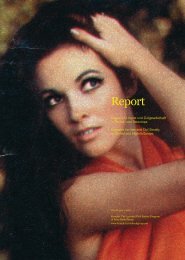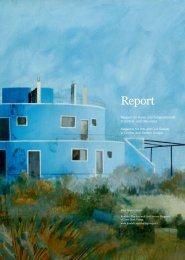Report_Issue 1/2009 - Jubiläum/ 20 Jahre Mauerfall
Report_Issue 1/2009 - Jubiläum/ 20 Jahre Mauerfall
Report_Issue 1/2009 - Jubiläum/ 20 Jahre Mauerfall
Erfolgreiche ePaper selbst erstellen
Machen Sie aus Ihren PDF Publikationen ein blätterbares Flipbook mit unserer einzigartigen Google optimierten e-Paper Software.
— Mircea Cărtărescu —<br />
In 1989 I was thirty-three. I was born in Communism and believed that I would die in Communism<br />
too. I had never left Romania and didn’t even have a passport. I also believed that I would<br />
never travel anywhere abroad. I had not been permitted to apply for a place in the university or<br />
to write a doctoral dissertation. I was a primary school teacher, and my only realistic opportunity<br />
was to move from this job to a pension in due course. We lived in an apartment on the eighth floor<br />
of a block, and there was not a single wall at right angles to another. The world seemed to be frozen<br />
in its unpleasantness and predictability. Communism was reality. Everything else was a fantasy<br />
from American films.<br />
The revolution took us by surprise, and we believed in it. When you find yourself in a crowd of a<br />
million people, who are embracing each other and weeping for joy, you no longer ask who brought<br />
them all together and why. Of all these, thousand were shot and killed. And then Ceaus¸escu was<br />
shot as well: I had really believed him to be immortal.<br />
This was all shown on TV. Actually, it was one continuous film running for several weeks and<br />
providing times of exaltation and despair. And yet, even though everything was completely identifiable,<br />
even though the effects were created at a superficial level, even though the sets were cheap<br />
and the dialogues packed with clichés, even though the strings held in false suspense by the illusionists<br />
were easy to see, we believed in that dream with our eyes open. The revolution was our<br />
soap opera, our syrupy illusion. Even now I cannot forgive myself for having believed in it, for in a<br />
normal world not even children would have believed in it. But I wished too intensely that it might<br />
be true.<br />
In 1990 we entered the free democratic world, without knowing what freedom and democracy are.<br />
After fifty years of fascist and communist dictatorships we were no longer a people, no longer a<br />
community. We were a horde. The communist dictatorship continued under a transparent nickname.<br />
Before that we had been lied to, now they were telling us lies. Before that we were poor, now<br />
we were even poorer. In the university my salary was the equivalent of fifty dollars a month. My<br />
wife was unemployed, and we had a little child. The inflation was dreadful; it ate into us like a bath<br />
of sulphuric acid. Soon we had nothing left at all. But it was not until I had sold my table tennis<br />
racket that I realised what depths we had sunk to.<br />
On a lovely mild autumn day I climbed into the tram for the flea market in Colentina. The tram<br />
was much more densely packed than anyone in the normal world could imagine. The doors were<br />
open during the journey, people were hanging from the straps, standing on the steps and had<br />
climbed onto the bumpers. In fact the tram was covered by a bunch of men and women who<br />
wanted to go to the market.<br />
The nineties, the most miserable years I ever experienced, will always be associated with the flea<br />
market in my mind, to which the trams carried hundreds, thousands and tens of thousands of<br />
people from six o’clock in the morning on, all of them wanting to buy and sell items that would<br />
normally be due for the rubbish tip. It is impossible to imagine the dirt and the dust and the scatological<br />
smells that one forced one’s way into, tightly crushed by people from all sides, who were<br />
treading on each other’s feet. On the ground, on crumpled newspapers full of photos of naked<br />
women, lay bent screwdrivers, torn books, bleary-eyed newborn kittens, imitation perfumes, dolls<br />
with their legs torn out, empty ballpoint pen cases, records of folk music, greasy clothes with torn<br />
seams, knives and forks one would never want to eat from, plugs, lamps, bits of wire, nails, old<br />
photos, rotting icons, mechanical tools that were totally unidentifiable and million other objects.<br />
Unshaven creatures were selling these, fat women with covered heads, gypsies, children starved<br />
to a skeleton like those in Biafra. There, in that infernal stream that constantly moved along under<br />
the autumn sky, I – a writer who had already published a number of books, now a university<br />
teacher – spread out the customary newspaper and laid the only item on it that I could sell: my<br />
old and greatly loved table tennis racket, with which I had won several competitions. I was really<br />
hoping not to find a buyer, but there were still two days to go to pay day, and we needed some<br />
bread at least.<br />
And evening came, and morning came. My racket had already been dulled by millions of eyes,<br />
when finally someone, after weighing it in his hand and hitting a few imaginary celluloid balls<br />
with it, pulled the money from his pocket and went off with it. We folded the newspaper again and<br />
joined the others heading for the way out. Dry leaves were snowing down on us. Wind stirred dust<br />
into our hair. Next to the exit I flipped through a pile of ebonite disks, watched over by a fellow<br />
with a punk haircut. All the money I had received for the table tennis racket went on three records:<br />
“Blonde on Blonde” by Bob Dylan, John Lennon’s “Mind Games” and “The Dark Side of the Moon”<br />
by Pink Floyd. With the records under my arm I went away happily, having forgotten the bread as<br />
well as the fact that we had nothing we could play the records on.<br />
I still own those records to this day. I have never managed to drive out their nasty smell. They<br />
smell of the nineties in Romania, of fear, uncertainty and despair. I have never listened to them.<br />
And then the miners came to Bucharest. Once, twice, thrice – six times altogether. I saw the street<br />
fighting, I saw young, elegant women dragged away by their hair to be beaten and raped in the<br />
staircases of the apartment blocks. I saw how people were tortured simply because they were<br />
wearing glasses. On the streets of this city I heard the most apocalyptic cry of the world: “Death<br />
to the intellectuals!” How sick does a society have to be before it utters such a scream of agony?<br />
I recalled Lautréamont: “All the oceans of the world are not enough to wash away the blood of a<br />
single intellectual.” My parents were on the side of the neo-communists and applauded the miners<br />
in the streets. We argued violently and didn’t speak to each other for a year. This happened in<br />
many Romanian families. It was hell.<br />
A well-known poet, a former dissident, said in those years: “I was happier in the Ceaus¸escu years”.<br />
Ordinary people said: “Things were better then, you had a safe workplace and there was no inflation.”<br />
They had forgotten that they had almost starved to death, no longer recalled the cold of winter,<br />
when water froze in the heaters so that they burst in the apartments. In the same way, the Jews<br />
led into the desert by Moses cried out and regretted leaving Egyptian slavery: “Didst thou lead us<br />
here so that our bones may bleach in the desert? Where are the food pots of yesteryear?”<br />
I began to travel abroad. I spent years in Amsterdam, Berlin, Budapest, Vienna and Stuttgart.<br />
When I saw Manhattan, I wrote a despairing poem. I was at the top of the Empire State Building.<br />
I wept and wrote in a notebook supported on the balustrade. My clothes fluttered in the wind like<br />
banners. Who stole the best years of my life from me? Who made me of no use to the East or to<br />
the West? I was like the Magi from Eliot’s poem: I did not find my place in Romania, but I was<br />
unhappy in the West as well. I could see no way out. The painful transition (to what?) would go<br />
on forever.<br />
Every return to Romania was depressing: now I could see the physical and moral decline even<br />
more clearly. I saw the cracks in the unrenovated buildings, the holes in the asphalt of the streets,<br />
the lies of the politicians and the general corruption better than before, when I had nothing to<br />
compare them with. Now I knew how a human being should live and what a country should be<br />
like.<br />
Only after the year <strong>20</strong>00 did things begin to get better. The normality that some take for granted is<br />
a heavenly miracle for us. It is incredible how long we had to fight for a little bit of normality.<br />
Last year I bought a cottage in the forest, north of the city. For the first time in my life I am now<br />
living on the earth and not on one floor or another of a concrete block. I planted a cherry tree in<br />
the garden; it was the first tree I ever planted in the ground. At night I see the star-covered sky for<br />
the first time in my life. And I also thought this year for the first time that real life is starting now,<br />
after fifty years of unhappiness.<br />
Translated by Nelson Wattie<br />
Mircea Cărtărescu, born in Bucharest in 1956 is a poet, writer and literary critic. He has published more than<br />
<strong>20</strong> books, which until now have been translated into 15 languages. Cărtărescu is also Professor for Literature at<br />
Bucharest University and a member of the Romanian Writers’ Association, the Pen Club and the “ASPRO Writers’<br />
Union”. His publications have won a number of awards, including the most important literary prize of Romania and<br />
the Acerbi Prize in Italy. His novel “Die Wissenden” [Those Who Know] was published in German by Zsolnay Verlag<br />
(Vienna) in <strong>20</strong>07. It is the first part of a trilogy with the general title “Orbitor” in the Romanian original. Cărtărescu’s<br />
short story collection “De ce iubim femeile” was a bestseller in Romania in <strong>20</strong>05. The German translation was<br />
published in <strong>20</strong>08 by Suhrkamp (Frankfurt am Main). Cărtărescu wrote the present story “ANII FURA I” (The Stolen<br />
Years) especially for “<strong>Report</strong>”.<br />
55




